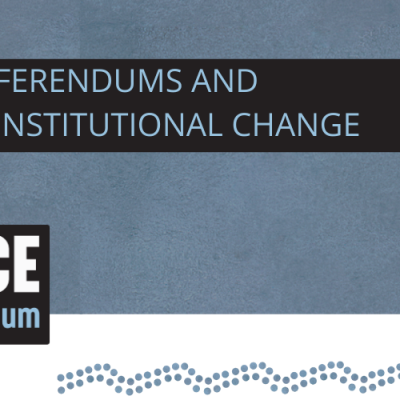Refine results
-
Aboriginal and Torres Strait Islander Social Justice2 June 2025Speech
Mabo Oration 2025 One Land – Two Laws – It’s Black and White
Acknowledgements Good evening, all Distinguished guests, Elders, Aboriginal and Torres Strait Islander family, community, friends and colleagues - and my family, children and grandchildren who are here tonight – particularly my sister Kerry who has travelled from Rockhampton to be here, and my Aunty Kathy – my mum’s sister and the matriarch of our family who travelled from Sydney. My name is… -
Aboriginal and Torres Strait Islander Social Justice4 August 2023Webpage

Referendums and constitutional change
The Australian Electoral Commission (AEC) will hold a referendum in late 2023. The referendum will ask Australians whether the Constitution should be changed to include a recognition of the First Peoples of Australia by establishing an Indigenous Voice to Parliament -
Aboriginal and Torres Strait Islander Social Justice15 July 2014Book page
Chapter 3: How do we keep moving forward? A road map for our future
3.1 Introduction In chapters 1 and 2, I look back over the past 20 years that the Social Justice Commissioner position has been in place and think about the journey and our learning over this time. In this chapter, I want to explore how those lessons can take us forward to chart a confident course into the future and how the realisation of our rights can produce long term sustainable… -
14 December 2012Book page
Chapter 1: Towards a reconciled Australia: An agenda of hope - Social Justice Report 2010
Social Justice Report 2010 Back to Contents Chapter 1: Towards a reconciled Australia: An agenda of hope 1.1 Introduciton 1.2 Human rights: the overarching framework 1.3 Addressing Aboriginal and Torres Strait Islander disadvantage by rebuilding relationships 1.4 Conclusion 1.1 Introduction My son, your eyes search mine Hurt and puzzled by colour line Your black skin as soft as velvet shine… -
Legal14 December 2012Webpage
National Human Rights Consultation - Appendix 2
Back to Table of Contents Appendix 2 – Further specific measures that would better protect human rights in Australia Appendix 2: Further specific measures that would better protect human rights in Australia Contents 1 Aboriginal and Torres Strait Islander peoples 2 Asylum seekers, refugees and migrants 3 People trafficking 4 Counter-terrorism legislation 5 Gender equality 6 Gay, lesbian,… -
14 December 2012Book page
Annual Report 2008-2009: Chapter 7
The Commission’s policy work on issues of human rights and disability has involved sustained focus, and engagement with government, disability community experts and representatives, and industry bodies over many years, and particularly since the passage of the Disability Discrimination Act in 1992. -
Legal14 December 2012Webpage
Review of Australia’s Fourth Periodic Report on the Implementation of the International Covenant on Economic Social and Cultural Rights
Australian Human Rights Commission Submission to the United Nations Committee on Economic Social and Cultural Rights 17 April 2009 Download in Word [556KB] Download in PDF [207KB] Table of Contents 1 Introduction 2 Summary 3 Recommendations 4 Framework for human rights protection 4.1 Formal protection for econmic social and cultural rights Human Rights Commission (a) Australian Human Rights … -
Legal14 December 2012Webpage
CERD Index
Information concerning Australia and the International Convention on the Elimination of All Forms of Racial Discrimination Submission by the Australian Human Rights and Equal Opportunity Commission Click on the links below to also access: Information Note Australian NGO submission for the 13 th and 14 th session of the Committee Concluding observations of the Committee on AUSTRALIA… -
14 December 2012Book page
Social Justice Report 2006: Chapter 4: International developments on the rights of indigenous peoples – Closing the ‘protection gap’
Social Justice Report 2006 Back to Contents Chapter 4: International developments on the rights of indigenous peoples – Closing the ‘protection gap’ Back to Report Home (TOC) Chapter 2 Chapter 3 >> Chapter 4 International developments on the rights of indigenous peoples United Nations Reform and human rights The making of global commitments to action – The Millennium Development Goals…
